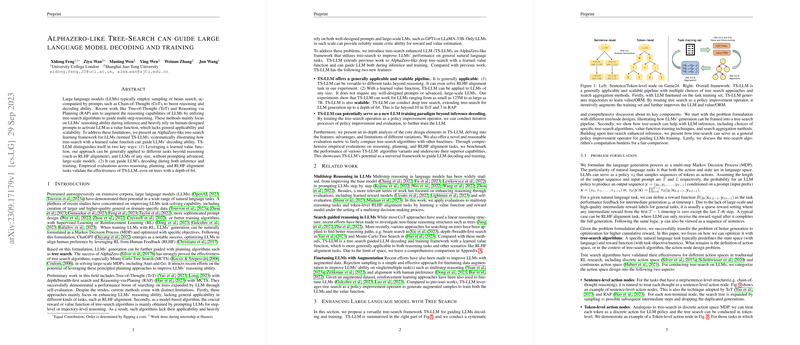AlphaZero-Like Tree-Search Can Guide LLM Decoding and Training
The research paper under discussion presents a novel framework termed TS-LLM, which integrates AlphaZero-like tree-search methods into the decoding and training processes of LLMs. This work seeks to enhance existing models' capabilities, particularly their reasoning, planning, alignment, and decision-making processes, by addressing the limitations seen in previous approaches such as Tree-of-Thought (ToT) and Reasoning via Planning (RAP).
Core Contributions
- Integration of Tree-Search Algorithms with LLMs: TS-LLM employs tree-search algorithms inspired by AlphaZero, using a learned value function to guide the LLM both in inference and training phases. This is a departure from prior methods that relied heavily on pre-trained LLMs' ability to act as value functions, which limited their applicability to tasks of limited search depth.
- Scalability and Versatility: The framework supports a wide array of tasks and model sizes, capable of operating on search trees with a significant depth of 64. This allows TS-LLM to handle complex tasks requiring extensive analytical depth and long-term planning.
- Enhanced Training Paradigm: TS-LLM goes beyond mere inference improvement, positing a novel training paradigm where improved trajectories from tree search guide further training, combining policy distillation, and value function learning.
Empirical Evaluation
The paper reports robust empirical results affirming TS-LLM’s superiority over existing strategies in several domains. Notably, it demonstrates notable advancements in complex tasks such as reasoning, where tree-search algorithms provide a pronounced edge over traditional methods like depth-first or breadth-first searches.
Numerical Results and Claims
The research notably claims that TS-LLM can outperform existing baselines in domains such as planning and decision-making. Numerical evaluations indicate its capability to conduct deeper searches, leading to better performance on tasks with varying complexities. The framework's empirical outcomes suggest a scalable and efficient improvement over conventional LLM methodologies.
Theoretical and Practical Implications
Theoretically, this work proposes a paradigm shift by systematically incorporating well-researched tree-search algorithms from areas like board games into LLMs, which is primarily dominated by gradient-based learning. Practically, TS-LLM stands to impact various domains where LLMs are applied, driving improved performance through its enhanced reasoning capabilities.
Future Directions
The integration of tree-search methods into LLMs opens a range of interesting future explorations:
- Algorithmic Refinements: Investigating more sophisticated tree-search algorithms could yield further performance improvements, especially in complex reasoning tasks.
- Scaling: Addressing computational overheads associated with tree-search in LLMs might facilitate application to even larger models and datasets.
- Generalization Across Domains: Assessing TS-LLM's effectiveness across a broader array of tasks, including those outside traditional LLM applications.
In summary, this work signifies an important step in enhancing LLMs' capabilities, with potential benefits spanning various AI applications. Through the innovative use of tree-search algorithms, it challenges the community to rethink traditional training and inference strategies within machine learning.
